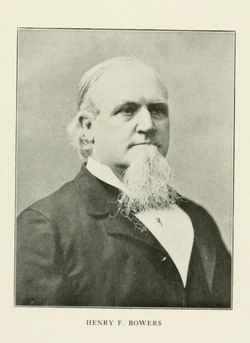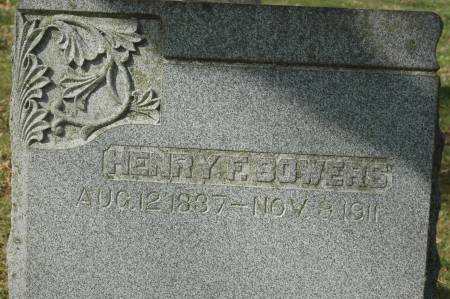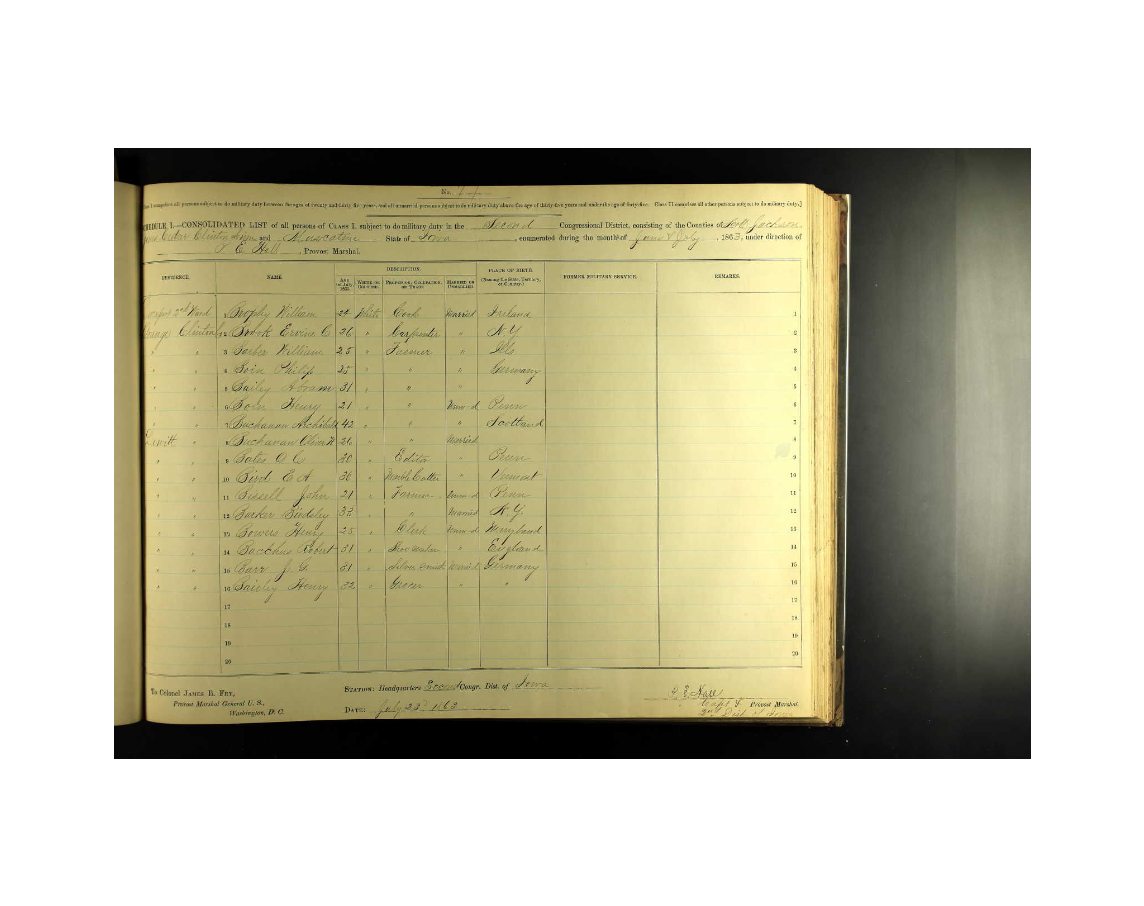Henry Francis Bowers was born in Baltimore, Maryland on August 12, 1837, the son of Augustus and Emeline (Lewis) Bowers. Augustus Bowers was a native of Germany and held a commission as second lieutenant in the German army. Coming to America to seek greater opportunities, he located in Baltimore, and there married Emeline Lewis, a native of the city. When returning to Germany on a visit, the ship on which he took passage sank and he was drowned.
Henry F. Bowers received his education under his mother and aunt, and later studied by candle light of evenings on the farm south of De Witt, in this county, to which the family removed in 1857. Before this time, while a mere boy, he had taken active part in the work of the "underground railroad." For a while he worked in De Witt as a carpenter and cabinetmaker. In 1863 he was appointed deputy clerk of Clinton county, which office he held for one term, then served two terms as deputy recorder, after which he was elected as recorder and filled this office to the satisfaction of the people for two terms.
During this time he studied law and was admitted to the bar on June 20, 1877, and as he had made a large acquaintance in the county, he obtained a good practice and has been successful. About this time he was appointed as special aid-de-camp to Governor Gear. In April 1879, he was admitted to practice in the supreme court of the state, and in 1882 to practice in the United State courts. During his thirty-three years of practice he has shown much aptitude for and skill in his profession. Throughout life he has made a special study of geology and is a recognized authority on the regions with which he is familiar, having discovered some rare specimens in Clinton county. His collection of geological and archaeological specimens is valued at thousands of dollars. The chapter on Geology in this work was contributed by Mr. Bowers.
Henry F. Bowers was the founder of the American Protective Association, which has had such widespread and powerful an influence, was its president for six years, and is now a member of the supreme council. This one fact has made him a man of national influence. He is a thirty-second-degree Mason, a member of the Methodist church, and in politics an unswerving Republican, in the ranks of which party he has been active and influential worker.
On October 25, 1870, Mr. Bowers was married to Emma V. Crawford, of Barnesville, Ohio, who died on October 24, 1878. She bore to him three children, Clyde C., Homer H., and Mrs. D. Jones. Mr. Bowers was again married to Eliza Wilson, daughter of the Hon. Thomas Wilson, of Dubuque, the first territorial judge of Iowa.
Mr. Bowers is a man of very marked individuality, and is exceptionally informed on most subjects, having acquired by his reading and experience an education which many a university man might envy. Certainly he is a man whose career is interesting and instructive, an example of what an able man may accomplish in living a valuable and happy life.
Henry Francis Bowers was born in Baltimore, Maryland on August 12, 1837, the son of Augustus and Emeline (Lewis) Bowers. Augustus Bowers was a native of Germany and held a commission as second lieutenant in the German army. Coming to America to seek greater opportunities, he located in Baltimore, and there married Emeline Lewis, a native of the city. When returning to Germany on a visit, the ship on which he took passage sank and he was drowned.
Henry F. Bowers received his education under his mother and aunt, and later studied by candle light of evenings on the farm south of De Witt, in this county, to which the family removed in 1857. Before this time, while a mere boy, he had taken active part in the work of the "underground railroad." For a while he worked in De Witt as a carpenter and cabinetmaker. In 1863 he was appointed deputy clerk of Clinton county, which office he held for one term, then served two terms as deputy recorder, after which he was elected as recorder and filled this office to the satisfaction of the people for two terms.
During this time he studied law and was admitted to the bar on June 20, 1877, and as he had made a large acquaintance in the county, he obtained a good practice and has been successful. About this time he was appointed as special aid-de-camp to Governor Gear. In April 1879, he was admitted to practice in the supreme court of the state, and in 1882 to practice in the United State courts. During his thirty-three years of practice he has shown much aptitude for and skill in his profession. Throughout life he has made a special study of geology and is a recognized authority on the regions with which he is familiar, having discovered some rare specimens in Clinton county. His collection of geological and archaeological specimens is valued at thousands of dollars. The chapter on Geology in this work was contributed by Mr. Bowers.
Henry F. Bowers was the founder of the American Protective Association, which has had such widespread and powerful an influence, was its president for six years, and is now a member of the supreme council. This one fact has made him a man of national influence. He is a thirty-second-degree Mason, a member of the Methodist church, and in politics an unswerving Republican, in the ranks of which party he has been active and influential worker.
On October 25, 1870, Mr. Bowers was married to Emma V. Crawford, of Barnesville, Ohio, who died on October 24, 1878. She bore to him three children, Clyde C., Homer H., and Mrs. D. Jones. Mr. Bowers was again married to Eliza Wilson, daughter of the Hon. Thomas Wilson, of Dubuque, the first territorial judge of Iowa.
Mr. Bowers is a man of very marked individuality, and is exceptionally informed on most subjects, having acquired by his reading and experience an education which many a university man might envy. Certainly he is a man whose career is interesting and instructive, an example of what an able man may accomplish in living a valuable and happy life.
Family Members
Sponsored by Ancestry
Advertisement
Advertisement












